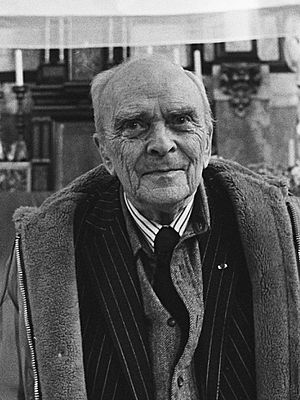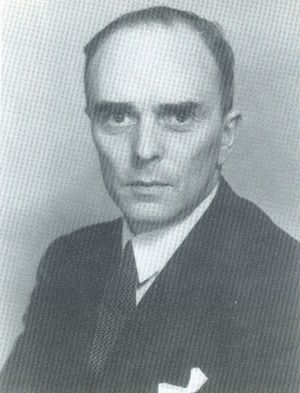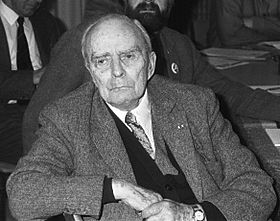Seán MacBride facts for kids
Quick facts for kids
Seán MacBride
|
|
|---|---|

MacBride in 1984
|
|
| Minister for External Affairs | |
| In office 18 February 1948 – 13 June 1951 |
|
| Taoiseach | John A. Costello |
| Preceded by | Éamon de Valera |
| Succeeded by | Frank Aiken |
| Leader of Clann na Poblachta | |
| In office 21 January 1946 – 3 June 1965 |
|
| Preceded by | New office |
| Succeeded by | Office abolished |
| Chief of Staff of the IRA | |
| In office 24 April 1936 – 1937 |
|
| Preceded by | Moss Twomey |
| Succeeded by | Tom Barry |
| Teachta Dála | |
| In office February 1948 – March 1957 |
|
| Constituency | Dublin South-West |
| In office October 1947 – February 1948 |
|
| Constituency | Dublin County |
| Personal details | |
| Born | 26 January 1904 Paris, France |
| Died | 15 January 1988 (aged 83) Dublin, Ireland |
| Resting place | Glasnevin Cemetery, Dublin, Ireland |
| Nationality | Irish |
| Political party | |
| Spouse |
Catalina Bulfin
(m. 1924–1976) |
| Children | 2 |
| Parents |
|
| Relatives | Iseult Gonne (half sister) |
| Education |
|
| Alma mater | University College Dublin |
Seán MacBride (born January 26, 1904 – died January 15, 1988) was an important Irish politician and human rights activist. He served as the Minister for External Affairs for Ireland from 1948 to 1951. He was also the leader of a political party called Clann na Poblachta from 1946 to 1965. Earlier in his life, he was the Chief of Staff of the Irish Republican Army (IRA) from 1936 to 1937. He was a member of the Irish parliament, known as a Teachta Dála (TD), from 1947 to 1957.
Beyond his work in Ireland, Seán MacBride helped create or joined many international groups in the 20th century. These included the United Nations, the Council of Europe, and Amnesty International. For his efforts, he received the Nobel Peace Prize in 1974. He also won the Lenin Peace Prize in 1975–1976 and the UNESCO Silver Medal in 1980.
Contents
Seán MacBride's Early Life
Seán MacBride was born in Paris, France, in 1904. His parents were Major John MacBride and Maud Gonne. French was his first language, and he spoke English with a French accent throughout his life. He first went to school in Paris.
When his father was executed by the British in 1916 for his part in the Easter Rising, Seán was sent to school in Ireland. He attended Mount St Benedict's in Gorey, County Wexford, and later Downside School for a short time.
Getting Involved in Irish Politics
MacBride became involved in politics when he was young. In 1918, he helped the Sinn Féin party during an election. The next year, in 1919, when he was only 15, he joined the Irish Volunteers. This group later became part of the Irish Republican Army. He fought in the Irish War of Independence.
After the war, he disagreed with the Anglo-Irish Treaty of 1921. Because of this, he was put in prison by the Irish Free State during the Irish Civil War.
When he was released in 1924, MacBride studied law at University College Dublin. He also continued his activities with the IRA. For a short time, he worked as a personal secretary for Éamon de Valera, a future Irish leader. He even traveled with de Valera to Rome to meet important people.
In January 1925, on his 21st birthday, Seán MacBride married Catalina "Kid" Bulfin. She was four years older and shared his political beliefs. Her father, William Bulfin, was an Irish nationalist writer.
Before returning to Dublin in 1927, MacBride worked as a journalist in Paris and London. In Dublin, he became the IRA's Director of Intelligence.
Legal Career and Activism
In 1937, MacBride became a barrister, which is a type of lawyer. He then left the IRA when the Constitution of Ireland was put into law that same year. As a barrister, he often defended IRA members who were in prison. He worked to improve prison conditions and fought for justice. For example, in 1946, he showed that conditions in Portlaoise Prison were very bad.
Founding Clann na Poblachta
In 1946, Seán MacBride started a new political party called Clann na Poblachta. This party aimed to be both republican and socialist. He hoped it would become one of Ireland's main political parties.
In October 1947, he won a seat in the Irish parliament, Dáil Éireann, in a special election. This was for the Dublin County area.
Joining the Government
In the 1948 general election, Clann na Poblachta won ten seats. The party then joined with other parties, including Fine Gael and the Labour Party, to form a government. John A. Costello became the Taoiseach (Prime Minister).
Seán MacBride became the Minister for External Affairs. Another member of his party, Noël Browne, became the Minister for Health. MacBride played a key role in making Ireland officially a republic in 1949. This meant Ireland was no longer linked to the British monarchy.
He also helped Ireland avoid joining the North Atlantic Treaty Organisation (NATO). He was involved in creating the European Convention on Human Rights, which protects people's basic rights.
In 1951, Clann na Poblachta won fewer seats in the general election. MacBride kept his seat but later lost it in 1957. After that, he left Irish politics and continued his work as a barrister.
Working for Human Rights Worldwide
Seán MacBride became very active in international human rights work. From 1961 to 1975, he was the International Chairman of Amnesty International. This organization works to protect human rights around the world. He also served as Secretary-General of the International Commission of Jurists from 1963 to 1971.
He was also involved with the International Peace Bureau in Geneva, serving as its Chair and later President. He helped draft the constitution for the Organisation of African Unity (OAU). He also helped write the first constitution for Ghana, which was the first African country to gain independence from the UK.
Important Roles at the United Nations
MacBride held several important positions at the United Nations System. He was an Assistant Secretary-General and President of the General Assembly. He also served as the United Nations High Commissioner for Namibia. In this role, he helped create the United Nations Institute for Namibia.
He was also President of a UNESCO commission that looked at communication issues. This commission produced a well-known report called the MacBride report in 1980.
Awards for Peace and Human Rights
Seán MacBride's dedication to human rights earned him many awards. In 1974, he received the Nobel Peace Prize. The award recognized him for "mobilizing the conscience of the world in the fight against injustice." He also received the Lenin Peace Prize in 1975–76 and the UNESCO Silver Medal for Service in 1980. He was one of only two people to win both the Nobel and Lenin peace prizes.
In the 1980s, he started an appeal by lawyers against nuclear war. He pushed for the International Court of Justice to give an opinion on whether nuclear weapons were legal.
Later Life and Legacy
In his later years, MacBride lived in his mother's home in Dublin. He also enjoyed visiting the Parisian neighborhood where he grew up. He once said that Amnesty International was "one of my children," showing how much it meant to him.
Seán MacBride passed away in Dublin on January 15, 1988, just before his 84th birthday. He is buried in Glasnevin Cemetery with his mother and his wife, who died in 1976.
Many people remembered his contributions. The African National Congress (ANC) leader, Oliver Tambo, said that MacBride would always be remembered for his leadership in helping the people of Namibia and South Africa.
Remembering Seán MacBride
Today, streets in Windhoek, Namibia, and Amsterdam are named after him. The main office of Amnesty International Ireland is called 'Seán MacBride House'. The International Peace Bureau also named the 'Seán MacBride Prize' in his honor.
In 1995, a statue of MacBride was unveiled at Iveagh House, the headquarters of the Irish Department of Foreign Affairs.
Career Summary
- 1946–1965 Leader of Clann na Poblachta
- 1947–1958 Member of Dáil Éireann (Irish Parliament)
- 1948–1951 Minister for External Affairs of Ireland
- 1948–1951 Vice-president of the Organization for European Economic Cooperation (OEEC)
- 1950 President, Committee of Ministers of Council of Europe
- 1963–1971 Secretary-General, International Commission of Jurists
- 1961–1975 Chairman of Amnesty International Executive
- 1968–1985 President of the Executive International Peace Bureau
- 1973–1977 United Nations Commissioner for Namibia
- 1977–1980 Chairman, Commission on International Communication for UNESCO
See also
 In Spanish: Seán MacBride para niños
In Spanish: Seán MacBride para niños
 | Bayard Rustin |
 | Jeannette Carter |
 | Jeremiah A. Brown |



